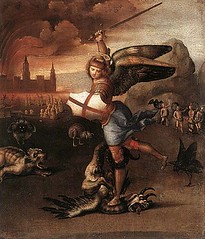 THE GREAT HERESIES by Hilaire Belloc Chapter Four
THE GREAT HERESIES by Hilaire Belloc Chapter Four
The Great and Enduring Heresy of Mohammed
It might have appeared to any man watching affairs in the earlier years of the seventh century -- say from 600 to 630 -- that only one great main assault having been made against the Church, Arianism and its derivatives, that assault having been repelled and the Faith having won its victory, it was now secure for an indefinite time.
Christendom would have to fight for its life, of course, against outward unchristian things, that is, against Paganism. The nature worshippers of the high Persian civilization to the east would attack us in arms and try to overwhelm us. The savage paganism of barbaric tribes, Scandinavian, German, Slav and Mongol, in the north and centre of Europe would also attack Christendom and try to destroy it. The populations subject to Byzantium would continue to parade heretical views as a label for their grievances. But the main effort of heresy, at least, had failed -- so it seemed. Its object, the undoing of a united Catholic civilization, had been missed. The rise of no major heresy need henceforth be feared, still less the consequent disruption of Christendom.
By A.D. 630 all Gaul had long been Catholic. The last of the Arian generals and their garrisons in Italy and Spain had become orthodox. The Arian generals and garrisons of Northern Africa had been conquered by the orthodox armies of the Emperor.
It was just at this moment, a moment of apparently universal and permanent Catholicism, that there fell an unexpected blow of overwhelming magnitude and force. Islam arose -- quite suddenly. It came out of the desert and overwhelmed half our civilization. Islam -- the teaching of Mohammed -- conquered immediately in arms.
Mohammed's Arabian converts charged into Syria and won there two great battles, the first upon the Yarmuk to the east of Palestine in the highlands above the Jordan, the second in Mesopotamia. They went on to overrun Egypt; they pushed further and further into the heart of our Christian civilization with all its grandeur of Rome. They established themselves all over Northern Africa; they raided into Asia Minor, though they did not establish themselves there as yet. They could even occasionally threaten Constantinople itself. At last, a long lifetime after their first victories in Syria, they crossed the Straits of Gibraltar into Western Europe and began to flood Spain. They even got as far as the very heart of Northern France, between Poitiers and Tours, less than a hundred years after their first victories in Syria -- in A.D. 732.
They were ultimately thrust back to the Pyrenees, but they continued to hold all Spain except the mountainous north-western corner. They held all Roman Africa, including Egypt, and all Syria. They dominated the whole Mediterranean west and east: held its islands, raided and left
armed settlements even on the shores of Gaul and Italy. They spread mightily throughout Hither Asia, overwhelming the Persian realm. They were an increasing menace to Constantinople. Within a hundred years, a main part of the Roman world had fallen under the power of this new and strange force from the Desert.
Such a revolution had never been. No earlier attack had been so sudden, so violent or so permanently successful. Within a score of years from the first assault in 634 the Christian Levant had gone: Syria, the cradle of the Faith, and Egypt with Alexandria, the mighty Christian See. Within a lifetime half the wealth and nearly half the territory of the Christian Roman Empire was in the hands of Mohammedan masters and officials, and the mass of the population was becoming affected more and more by this new thing. Mohammedan government and influence had taken the place of Christian government and influence, and were on the way to making the bulk of the Mediterranean on the east and the south Mohammedan.
We are about to follow the fortunes of this extraordinary thing which still calls itself Islam, that is, "The Acceptation" of the morals and simple doctrines which Mohammed had preached.
I shall later describe the historical origin of the thing, giving the dates of its progress and the stages of its original success. I shall describe the consolidation of it, its increasing power and the threat which it remained to our civilization. It very nearly destroyed us. It kept up the battle against Christendom actively for a thousand years, and the story is by no means over; the power of Islam may at any moment re-arise.
But before following that story we must grasp the two fundamental things -- first, the nature of Mohammedanism; second, the essential cause of its sudden and, as it were, miraculous success over so many thousands of miles of territory and so many millions of human beings.
Continued
Monday, October 1, 2007
The Great and Enduring Heresy of Mohammed - by Hilaire Belloc
Subscribe to:
Post Comments (Atom)




No comments:
Post a Comment